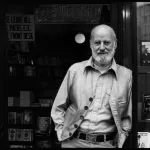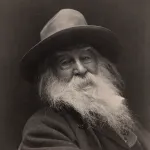About me the night moonless wimples the mountains
wraps ocean land air and mounting
sucks at the stars The city throbbing below
webs the sable peninsula The golden
strands overleap the seajet by bridge and buoy
vault the shears of the inlet climb the woods
toward me falter and halt Across to the firefly
haze of a ship on the gulf’s erased horizon
roll the lambent spokes of a lighthouse
Through the feckless years we have come to the time
when to look on this quilt of lamps is a troubling delight
Welling from Europe’s bog through Africa flowing
and Asia drowning the lonely lumes on the oceans
tiding up over Halifax now to this winking
outpost comes flooding the primal ink
On this mountain’s brutish forehead with terror of space
I stir of the changeless night and the stark ranges
of nothing pulsing down from beyond and between
the fragile planets We are a spark beleaguered
by darkness this twinkle we make in a corner of emptiness
how shall we utter our fear that the black Experimentress
will never in the range of her microscope find it? Our Phoebus
himself is a bubble that dries on Her slide while the Nubian
wears for an evening’s whim a necklace of nebulae
Yet we must speak we the unique glowworms
Out of the waters and rocks of our little world
we conjured these flames hooped these sparks
by our will From blankness and cold we fashioned stars
to our size and signalled Aldebaran
This must we say whoever may be to hear us
if murk devour and none weave again in gossamer:
These rays were ours
we made and unmade them Not the shudder of continents
doused us the moon’s passion nor crash of comets
In the fathomless heat of our dwarfdom our dream’s combustion
we contrived the power the blast that snuffed us
No one bound Prometheus Himself he chained
and consumed his own bright liver O stranger
Plutonian descendant or beast in the stretching night—
there was light
This wartime poem looks out at Vancouver’s nighttime skyline and contemplates humanity.
- One of the first things you might notice about this poem is how it often puts lots of space between words. Does this poem contain any punctuation? How do you “read” those spaces in the poem? What are those spaces doing?
- This poem casts a very wide net: the speaker looks out at the city’s lights and thinks about the ocean’s currents connecting continents, about the planets and the stars, about being and nothingness, and about how humanity will be remembered. Where does that lead us? What is the poem’s speaker ultimately saying about humanity in this poem?
- It’s thought that Earle Birney wrote this poem around 1939, after the Second World War started. Does that affect your reading of the poem, to know when it was written? When you first read the poem, did you have a sense of its era? How do you read that line “we contrived the power the blast that snuffed us” as someone who’s living right now?
- Note all the proper names in this poem: Phoebus, Halifax, Aldebaran, Prometheus, Asia, etc. How many of these names do you not recognize? How does that affect your reading of this poem?
- Is this a quiet poem or a loud poem? What volume or level of emotional force do you hear in your mind when you read it to yourself? Do those spaces in the middle of lines calm things down or ratchet up the intensity for you? Considering how the poem is laid out on the page, how would you recite it?
- Try writing your own night poem. Stare out a window or go outside when it’s dark. Start by taking note of what’s around you, then let your mind wander. Follow it wherever it leads. Let the scope of the poem get wide.
Useful Links
Here’s a brief essay by Diné poet Orlando White about using space on the page in poetry to “express a silence.”
Compare the myth of Prometheus with Birney’s telling of what became of him.
Here’s a (daytime) view of the downtown Vancouver skyline in 1939, thought to be the year Birney wrote his poem. Now imagine the sun setting on this view and a poet happening by...
Earle Birney, “Vancouver Lights” from One Muddy Hand: Selected Poems, Harbour Publishing Copyright © 2006 The Estate of Earle Birney.





